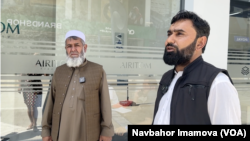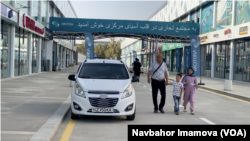Uzbekistan free economic zone opens door for Afghan entrepreneurs

Termez, Uzbekistan - Afghans longing for closer connections with the outside world are finding an outlet in the border city of Termez, where neighboring Uzbekistan invites them to visit a new international trade center aimed at boosting regional trade and creating business opportunities.
"It's uplifting to be here, as we've been dreaming about creating a common market for so long. Perhaps this is the beginning of it, despite all the challenges," said Ajmalik Nader Saghpi, a visitor from Afghanistan's Laghman Province.
Nearby, other Afghan men approach along a dedicated corridor leading from the border control area and lounge on a green lawn in front of a prayer hall.
Branded as the Airitom Free Zone, the facility sits on the banks of the Amu Darya, a river marking the border between Uzbekistan and Afghanistan and feeding much of Central Asia. Airitom is a neighborhood in Termez, the administrative center of Uzbekistan's Surkhandarya region, which also borders Tajikistan and Turkmenistan.
Built at a cost of around $70 million, the zone spans 36 hectares and is guarded by special forces and police. It features a customs office and storage area capable of handling 100,000 trucks and 900,000 tons of goods a year.
 FILE - With the free economic zone on the border, the Uzbek government hopes to boost commerce with Afghanistan and expand regional trade. This Aug. 6, 2024, photo taken in Termez, Uzbekistan, shows a model of the zone.
FILE - With the free economic zone on the border, the Uzbek government hopes to boost commerce with Afghanistan and expand regional trade. This Aug. 6, 2024, photo taken in Termez, Uzbekistan, shows a model of the zone.
It also includes a Hilton Garden Inn, a high-tech hospital, an academic campus, Uzbek and Turkish restaurants, and 50,000 square meters of business space, along with banking and legal services. It is separate from the nearby Termez Cargo Center, an international transport and logistics hub.
 Abdugaffor Ergashev, representative of the Uzbek manufacturer Aisha Home Textile, said his company is eager to export to Afghanistan and beyond. Termez, Uzbekistan, Sept. 5, 2024.
Abdugaffor Ergashev, representative of the Uzbek manufacturer Aisha Home Textile, said his company is eager to export to Afghanistan and beyond. Termez, Uzbekistan, Sept. 5, 2024.
When VOA toured the zone in August and saw the model, managers said the site, once fully functional, is projected to generate $1.2 billion in trade and attract 1.5 million visitors a year.


Uzbekistan Urges Other Nations to Help Neighboring Afghanistan
"We're not fantasizing," said Bakhtiyor Rahimov, the zone's manager, acknowledging challenges in the region. "We believe this is realistic because we have studied the neighboring country and others around us, surveyed businesses, and discussed our vision with Afghan leaders. We know they are keen to work with us."
Those high hopes have been echoed by high-profile visitors including Uzbek Prime Minister Abdulla Aripov, Taliban's acting Prime Minister Abdul Ghani Baradar, and cabinet members from Kyrgyzstan, Kazakhstan, and Azerbaijan.


Uzbek Border Town Adjusts to the Taliban as Neighbors
Any foreigner can stay in the zone for two weeks visa-free. Visitors can conduct commerce in any currency, customs-free.
President Shavkat Mirziyoyev instructed that 40% of the space be allocated to Afghan manufacturers and traders, and up to 30% of the projected 5,000 jobs can go to them.
Hakim Yar, a businessman from Balkh, the nearby Afghan province, plans to open a couple of offices here for export-import and for an agricultural firm he runs in the Afghan city of Mazar-i-Sharif. He is satisfied with what's available in the zone and is among those Afghans already occupying 5% of the space.
 Qari Shergulan from Nangarhar and Ajmalik Nader Saghpi from Laghman provinces of Afghanistan talk with VOA in the Airitom Free Zone, Termez, Uzbekistan, Sept. 5, 2024.
Qari Shergulan from Nangarhar and Ajmalik Nader Saghpi from Laghman provinces of Afghanistan talk with VOA in the Airitom Free Zone, Termez, Uzbekistan, Sept. 5, 2024.
Qari Shergulan, from Nangarhar, envisions that more Afghans will come if entrepreneurs like him return home with positive experiences. He says his people are eager to seize opportunities wherever they find them and won't waste any chance to grow.
"We have not lost our potential. We can still work, build, trade, earn, expand, and invest," Shergulan told VOA when asked about the economic conditions in Afghanistan.
None of the Afghan visitors VOA spoke with complained about the Taliban. Instead, they praised Kabul's cooperation with the Uzbek government and its support for efforts like the new trade center.
However, they mentioned electricity shortages, unemployment, diminishing manufacturing, and lack of opportunities across Afghanistan, particularly for youth.
Tashkent-based Central Asian University is opening a campus in the zone, promising free education and residence for 200 Afghans, as well as business training for others.
"We will soon have a visa office here," said Mirkhamid Mirpulatov, the zone's CEO. "Foreigners seeking work, study, or services here for a longer period can apply for visas.
"The special corridor on the border, once you cross the bridge over the Amu Darya, is only for our zone. The access is limited to this area. Those interested in doing business outside the Airitom Free Zone need additional permissions," Mirpulatov explained.
Airitom is on the main transportation route linking Pakistan, Afghanistan, Uzbekistan, Kazakhstan, and Russia. This is a key factor for landlocked Uzbekistan, which is eager for access to ports on the Indian Ocean. The zone is also starting daily bus service between Airitom and Mazar-i-Sharif, about 60 kilometers away.
The private hospital in the zone is a branch of Tashkent-based Akfa Medline.
"The costs here are lower than in the capital," Mirpulatov said. "Afghans have been patients for years, so offering health care here on the border simplifies everything for them."
With 315 staff members and state-of-the-art operating and treatment facilities, Akfa Medline has adjusted its services to mainly cater to Afghans, creating separate units for men and women, something it does not do in Tashkent.
"We're doing this out of respect for our neighbor's culture, just as we're not allowing alcohol in the zone," Mirpulatov said, denying that Airitom is run under Taliban rules. "We do discuss business with them but make our own decisions."
Jahongir Artikkhodjayev, an Uzbek business tycoon and former mayor of Tashkent, is the mastermind behind the Airitom Free Zone. Mirpulatov confirmed that the zone is under Akfa Group, one of the largest Uzbek industrial holdings, founded and run by Artikkhodjayev.
As with other major projects in the country, President Mirziyoyev entrusted Artikkhodjayev with delivering this trade center, according to Mirpulatov, who calls Artikkhodjayev his mentor. Akfa Group secured the funds for the zone. There is no Western involvement so far, though South Asians, Russians, Chinese and Arabs have shown interest.


Uzbekistan Seeks to Engage Taliban Without Alienating West
US view on development
When VOA asked U.S. Ambassador to Uzbekistan Jonathan Henick about the Airitom Free Zone, he underscored America's overall position on Afghanistan and the Taliban.
"Broadly speaking, we support anything that helps ordinary Afghan people and contributes to stability along the border. We recognize that Uzbekistan has legitimate economic concerns that need to be addressed," he said.
"That should be separate from the question of the Taliban's desire for international recognition and access to funds. These issues must continue to be handled collectively by the international community through the Doha process," under which some 30 countries have been discussing how to advance international engagement on Afghanistan.
 An Afghan family checks out the newly opened international trade center in Termez, Uzbekistan, Sept. 5, 2024.
An Afghan family checks out the newly opened international trade center in Termez, Uzbekistan, Sept. 5, 2024.
Henick added, "We have a very strong dialogue with Uzbekistan about Afghanistan. Uzbekistan is an active participant in the Doha process. Our interests are closely aligned."
Other Western diplomats in Tashkent agreed with Henick that recognizing the regime in Kabul, based on human rights and governance conditions, is key to normalizing relations and attracting investment.
The Taliban remain angry over a recent deal under which several dozen U.S. aircraft that were flown to Uzbekistan as the Taliban seized control in Afghanistan have been transferred to Uzbek control. But, Henick said, Washington and Tashkent maintain "a robust military and security relationship."


US transfers 'some aircraft' used by former Afghan army to Uzbekistan
At the same time, Henick told VOA: "The U.S. is the largest contributor of humanitarian assistance to Afghanistan to this day. We provide enormous amounts of aid because, like Uzbekistan, we have an interest in ensuring there is no humanitarian crisis in Afghanistan."
